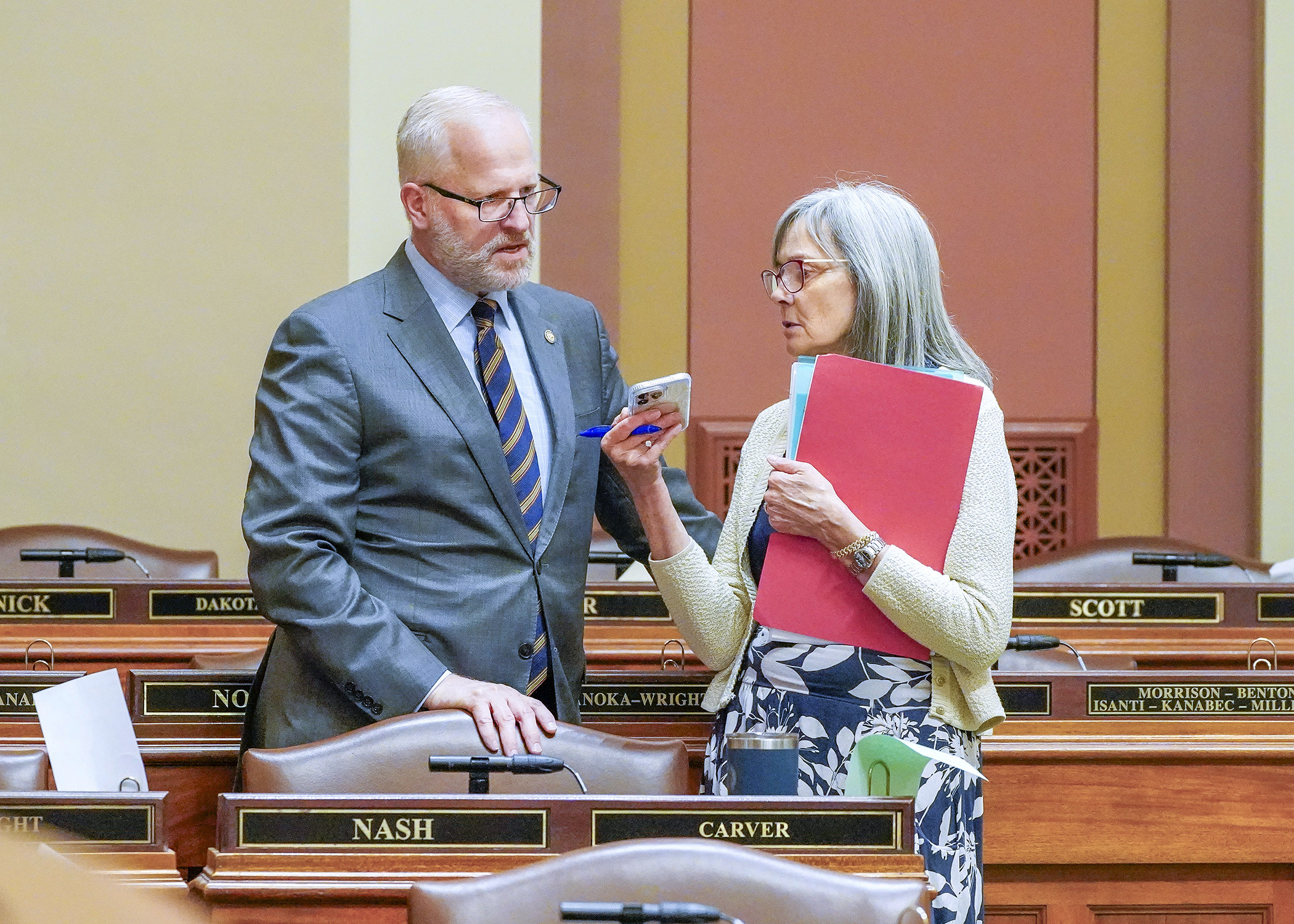House, Senate pass state government and elections bill ahead of session's adjournment

10:37 p.m. — UPDATED following floor votes
With about 90 minutes to spare on the last evening of the regular legislative session, House and Senate members passed a conference committee report that would provide funding for not only legislative operations, but the executive branch as well.
Local government and elections provisions are in there, too.
Without discussion, the conference committee for the omnibus state and local government and elections bill signed off around 8 p.m. on a $1.35 billion spending package for the 2026-27 biennium, a $46.5 million increase over base.
Senate approval came 36-31 a couple hours later; the House followed shortly thereafter with a 116-18 vote. Gubernatorial action is up next.
Rep. Ginny Klevorn (DFL-Plymouth) and Sen. Tou Xiong (DFL-Maplewood) sponsor the respective versions of HF2783/SF3045*.
“We have come here to ensure the government functions for the people and that’s what this bill does,” Klevorn said.
Added Rep. Jim Nash (R-Waconia), who co-chairs the House State Government and Finance and Policy Committee with Klevorn: “There are things in this bill for both sides of the aisle. … We do some things to control the waste, fraud and abuse that has been rampant in our state.”
Among the proposed increases are legislative operating adjustments of $23.2 million, including $13.92 million for the House, $4.62 million for the Senate, and almost $3.96 million for the Legislative Coordinating Commission.
Also included in that total is $579,000 for the Office of the Legislative Auditor to produce an annual report showing if identified recommendations by the office during the prior five years in a financial audit, program evaluation, or special review have been implemented.
Most state agencies and departments are slated to get a small operating increase, often to maintain current levels of service. The $1.04 million increase for election purposes includes $760,000 for the Campaign Finance and Public Disclosure Board for litigation expenses and $200,000 for a 2024 Help America Vote Act federal funds match.
[MORE: View the full, change item spreadsheets for state govt; change items for elections]
Elections spending in the bill totals $3.86 million in biennial spending, with a majority — $1.81 million in fiscal year 2026 and $1.84 million in fiscal year 2027 — going to the Campaign Finance and Public Disclosure Board.
[MORE: State government, elections conferees delve into finance, fraud and absentee voting]
Among policy agreements are provisions that would:
- allow an agency to withhold payments to a program participant for up to 60 days if there is a preponderance of evidence the participant has committed fraud to obtain payments;
- expand the scope of existing whistleblower protections for state employees;
- except where a provision of law to the contrary specifically prohibiting data sharing, any government entity may disclose data relating to suspected or confirmed fraud in public programs to any other government entity, federal agency, or law enforcement agency if the access would promote the protection of public resources, promote the integrity of public programs, or aid the law enforcement process;
- establish a retained savings program to encourage state agencies to innovate and identify efficiencies and cost savings;
- make the giant beaver the state fossil and Ursa Minor the state constellation;
- allow the Office of the Secretary of State to assess an up to $40 late penalty when a person files for renewal or reinstatement of business entity that was administratively dissolved;
- establish a process to challenge and remove fraudulent business filings filed with the Office of the secretary of State;
- modify the open meeting law to allow flexibility for remote participation; and
- decrease the Swift County Joint Powers Hospital District membership.
The agreement would change many aspects of absentee voting in Minnesota.
In part, applicants would be required to provide both a Minnesota driver’s license or state identification card number and the last four digits of their Social Security number to verify identity; mailed and online absentee ballot applications would need to be received at least five days before an election; and counties would need to develop a chain of custody plan for handling election-related materials, including absentee ballots.
[MORE: Committee approves $3.9 million election finance bill]
“The elections portion and campaign finance portion of this bill represents a lot of commonsense provisions,” said Rep. Mike Freiberg (DFL-Golden Valley). He co-chairs the House Elections Finance and Government Operations Committee with Rep. Duane Quam (R-Byron).
— Session Daily writer Brian Basham contributed to this story
Related Articles
Search Session Daily
Advanced Search OptionsPriority Dailies
Speaker Emerita Melissa Hortman, husband killed in attack
By HPIS Staff House Speaker Emerita Melissa Hortman (DFL-Brooklyn Park) and her husband, Mark, were fatally shot in their home early Saturday morning.
Gov. Tim Walz announced the news dur...
House Speaker Emerita Melissa Hortman (DFL-Brooklyn Park) and her husband, Mark, were fatally shot in their home early Saturday morning.
Gov. Tim Walz announced the news dur...
Lawmakers deliver budget bills to governor's desk in one-day special session
By Mike Cook About that talk of needing all 21 hours left in a legislative day to complete a special session?
House members were more than up to the challenge Monday. Beginning at 10 a.m...
About that talk of needing all 21 hours left in a legislative day to complete a special session?
House members were more than up to the challenge Monday. Beginning at 10 a.m...